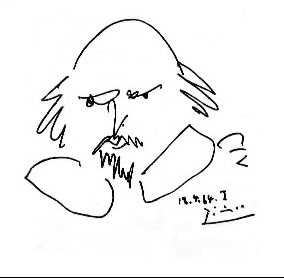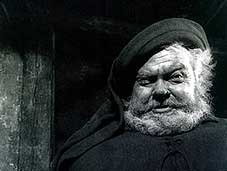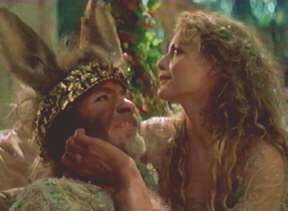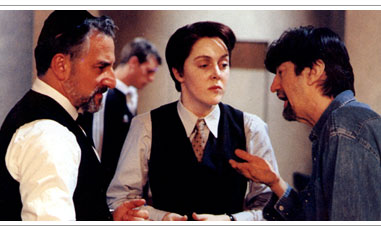 by Picasso
by Picasso The
Chandos Portrait
 by Picasso
by Picasso
Shakespeare I (Web Enhanced)
En 213 (formerly En 355)
Dr. Richard Regan
DMH 103
Fall 2013
Course Objectives (IDEA Center)
Essential: Gaining a broader understanding and appreciation of intellectual/cultural activity (#7)
Important: Learning to analyze and critically evaluate ideas, arguments, and points of view (#11)
Important: Developing skill in expressing yourself in writing (#8)
This course studies the first half of the career of William Shakespeare, generally considered the greatest writer in the English language. We focus on early comedies, history plays, and some mature comedies. Shakespeare's work teaches us about our own human natures. As many psychologists, philosophers, theologians, historians, and scientists have observed, Shakespeare has acute powers of observation. We see in his plays how people behave, how they feel, how they act politically. And we understand ourselves and our own world better, even as we learn about the Renaissance, or Early Modern era.
There are several ways to describe our approach: a flipped classroom, blended learning, hybrid courses. The burden of preparation and learning lies with students, not with the professor. For those of you who have taken a Shakespeare course with me before, this will be an entirely different experience.
The books I have chosen (the Signet Classics) also give us a clear focus on the words of the play, and have helpful notes at the bottom of each page. I know it is tempting to save money by reading the plays online or by using editions you already own, but it is imperative that you buy these individual Signet Classic paperbacks. They are inexpensive, and available in the Fairfield U. bookstore or at amazon.com (search the play title and the words "Signet Classic"). Since you will be exploring the plays yourselves, you need the Introductions and short critical articles from these editions.
Instead of my going through the plays three times a week in the classroom, we will meet about every other week to discuss the learning that will take place online and through your own reading. I have been teaching Shakespeare Online in the summer since 2005, and I feel comfortable having you study the "Class" pages for each play and video clips from different productions, either streaming from the Class page or downloaded from iTunes U.
A vital part of the course will be online discussions through email several times a week. I will supply a prompt (topic or question) through email and ask everyone to Reply All. The class will be divided so there's not a flood of mail, but you must reply with a couple of paragraphs that everyone in your group can read. You can respond to my prompt or to any member of the class. You must Reply All within 24 hours.
Course hours: Monday and/or Thursday 3:30-4:45. I will be available for consultation before and after class.
Texts: Signet Classic editions of the plays listed below.
Grading: You will write a 5-7 page paper on each play, and a final portfolio-metanarrative for the course. I expect you to have your topics approved in advance. I encourage rewriting.
You should submit your papers electronically, written in Microsoft Word. Word has a feature called Track Changes which we can use to write comments on papers (in color). Click here to download a document that contains some suggestions for writing in Word and for emailing papers as attachments.
Students with documented learning disabilities, please see me. Alternative methods of testing and evaluation are available.
Course description:
In the first half of Shakespeare's career, comedy, tragedy, and history plays express both the spirit of the Elizabethan age and their own identities as different genres which reference each other. A Midsummer Night’s Dream, Romeo and Juliet, Henry IV , and Much Ado About Nothing are among a selection of plays that explore dimensions of love, religion, and politics. We will learn how critics have approached Shakespeare in many different ways, and how to evaluate and respond to critical opinion. Multimedia presentations will show how performance and text combined enrich our understanding of this great writer.
Some fine Shakespeare productions can be viewed from this Library link:
http://ativ.alexanderstreet.com.libdb.fairfield.edu/Search/PersonID/219589/tab/video
Macbeth, with Anthony Sher
Measure for Measure, 2006 film
Hamlet, with Kevin Kline
The Taming of the Shrew, American Conservatory Theater
King Lear, with James Earl Jones
Much Ado About Nothing, New York Shakespeare Festival
Powerpoint Slide Shows from Hardy Cook and the Shaksper archives
Shakespeare's Life
Shakespeare's Theater
Shakespeare's Texts
The Elizabethan World Picture
"The Elizabethan Theatre": a lecture with slides
Designing Shakespeare (home)
Designing Shakespeare (digital resources)
Shakespeare in Performance Institute Acting Exercises
Interactive Shakespeare Project
Touchstone: Shakespeare in Performance
Terry Gray's Mr. William Shakespeare and the Internet
Was Shakespeare Shakespeare? The Authorship Controversy
The Shakespeare Discussion List Archive
Polydore Vergil's Anglica Historica (1555)
Podcasts
American
Shakespeare Center
The ASC offers a number of different podcasts, including This Week at the
Blackfriars, the Blackfriars Backstage Pass, the American Shakespeare Center
Chronicles, and Doctor Ralph Reveals All.
You can find links to all of these podcasts at the American Shakespeare Center's
Podcast Central; you can also subscribe to all ASC podcasts through the iTunes
Music Store Podcast Directory, or through any number of web-based podcasting
sites, including Podcast
Pickle.
American Shakespeare Podcast Central (Blackfriars Playhouse)
Mobile Phone Shakespeare
iTunes Store: Search <Shakespeare> for a free app for the iPhone with searchable text
Mobile Open Source Shakespeare
Here are the instructions for viewing the Class pages and video clips. You'll need a password from Dr. Regan: rjregan@fairfield.edu
Streaming
video is a part of the course because I've written classes to be interactive
with excerpts from performances. You will need a broadband internet connection.
Cable or DSL will work. Satellite is probably OK too. Dialup is too slow for
video, but you can view srteaming video on your iPhone or iPad (if it has 3G or 4G). Our method of streaming requires Safari or Firefox.
As you scroll down the course page, for each of the plays you will see a link
called "Click." That will take you to the Class, and when you click
on a video clip you will see a password box. The password will be given out
in class, a security measure because the TEACH Act passed by Congress in 2002
allows only enrolled students to have access to copyrighted materials for educational
purposes. Our method of streaming will open the clip in a window on your computer or mobile device. You need to use Safari or Firefox as a browser.
These video clips are also available from iTunes University, together with audio podcasts of our classes and some documents for each play. The clips can be expanded to full screen. Documents can be viewed as .pdf files only in iTunes. If you are on the class roster, you have access through:
Enter your NetID number as your user name. The password is your NetID password. This login will work as soon as the class begins.
If you are a Windows user, you can get iTunes free at:
http://www.apple.com/itunes/download/ (scroll to the Windows links)
Schedule
September 5 - Course orientation, Introduction to the first play, The Taming of the Shrew
The Internet Shakespeare Editions
RhymeZone Shakespeare Search Engine

CLICK to go to the Class on the play.
Read: the play and the Signet Introduction, and the articles by Mack, Greer, Bamber, Newman, and Slights
"Personations: The Taming of the Shrew..."
"'Caparisoned like the horse': Tongue and Tail in Shakespeare’s The Taming of the Shrew"
The Works of the Bard: including a SEARCH engine
Scanning
Shakespeare's Lines
(click on Teacher's Guide, then Scansion Guide)
Shakespeare: Subject to Change (Cable in the Classroom)

Read: the play and the Signet Introduction, and the articles by Rossiter, Ornstein, and Kahn
CLICK to go to the class on the play.
Richard III Society Online Library
Thomas More's "The History of King Richard III"
"The Misogyny of Richard III..."
Polydore Vergil's account (1555)
Paper #1 due September 23 - The Taming of the Shrew
Paper #2 due October 3 - Richard III
October 3 - Discussion of Henry IV, Part One

Preparation for Henry V
Read: the play and the Signet Introduction, and the articles by Ornstein and Goldman
"The Prudence and Kinship of Prince Hal..."
"The Prudence and Kinship of Prince Hal..."

Read: the play and the Signet Introduction, and the article by Collimore/Sinfield
CLICK to go to the Class on the play.
Paper #3 due October 14 - 1 Henry IV and Henry V
Paper #4 due October 24 - Romeo and Juliet and A Midsummer Night's Dream

Read: the play and the Signet Introduction, and the articles by Goldman, Snyder, and Novy
CLICK to go to the Class on the play.
"Baz Luhrmann's Romeo and Juliet: Kitsch and Tears"
"Shakespeare and the Tragic Virtue"
Bibliography on Shakespeare's Women
A Midsummer
Night's Dream

Read: the play and the Signet Introduction, and the articles by Myers, Bamber, and Slights
CLICK to go to the class on the play.
"...Petrarch and Pyramus in the Woods of Athens"
"From the Ridiculous to the Sublime"
A Study Guide to A Midsummer Night's Dream
A Midsummer Night's Web and MOO
A Hypertext Version of A Midsummer Night's Dream
October 31 - The
Merchant of Venice

Read: the play and the Signet Introduction, and the articles by Bamber and Smallwood
CLICK to go to the Class on the play.
Shakespeare and Anti-Semitism: The Question of Shylock
"A Second Daniel: The Jew and the 'True Jew' in The Merchant of Venice"
"Law and Love in The Merchant of Venice"
"Contract in The Merchant of Venice" (Project Muse access)
Excerpt from Sir Thomas More, II, i
Articles and reviews pertinent to the Radford/Pacino film
The Merchant of Venice -Interview with director and screenwriter Michael Radford
Shylock
on Appeal
"Shylock’s
isolation as character mirrors Shakespeare’s isolation as author"
"Sanitizing
Merchant: Pacino Plays Shylock Like a Grouchy Tevya"
Paper #5 due November 4 - The Merchant of Venice
November 14- Much Ado About Nothing

Read: the play and the Signet Introduction, and the articles by Stauffer and Neely
CLICK to go to the Class on the play.
"The Role of the Clown in Shakespeare's Theater"
Paper #6 due November 18 - Much Ado About Nothing
November 25 - As You Like It

Read: the play and the Signet Introduction, and the articles by Gardner, Erickson, and Howard
CLICK to go to the class on the play.
"Instruction Versus Deception: from Rosalynde to As You Like It"
"Orlando and the Golden World: the Old World and the New in AYLI"
THANKSGIVING HOLIDAY
December 5 - Final Class - Discussion of Metanarrative due the day of, and instead of the Final Exam
Paper #7 due December 9 - As You Like It